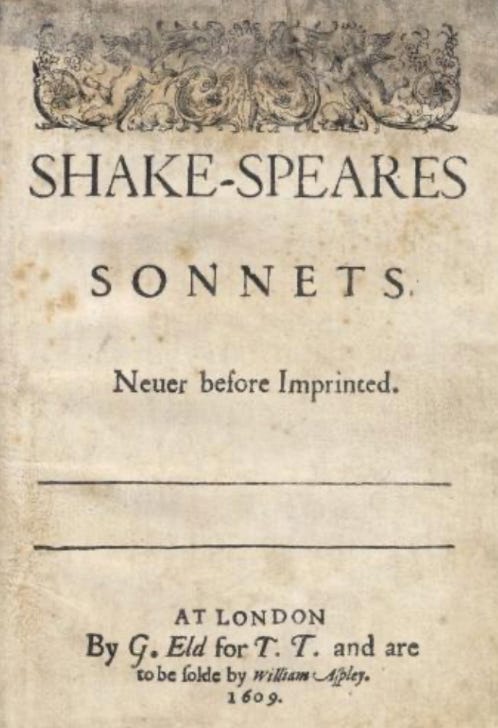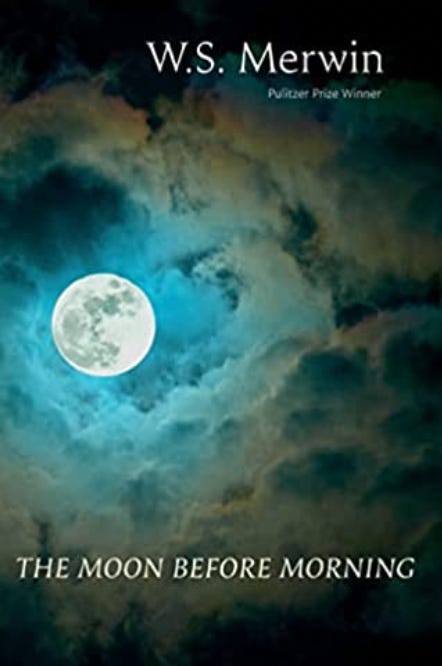TWA from Saturday, May 20, 2017
“Widnoon” from The Moon Before Morning by W. S. Merwin. Copyright © 2015 by W.S. Merwin, used by permission of The Wylie Agency LLC.
ORIGINAL TEXT AND AUDIO - 2017
Shakespeare's sonnets were first published on this day in 1609, most likely without Shakespeare's permission. The book contained 154 sonnets, all but two of which had never been published before. Shakespeare (or perhaps the publisher Thomas Thorpe) dedicated the collection to "Mr. W.H." whose identity has never been known. The poems are about love, sex, politics, youth, and the mysterious "Dark Lady," and they have given young lovers and the hopelessly romantic words for the ages:
Shall I compare thee to a Summer's day?
Thou art more lovely and more temperate:
Rough winds do shake the darling buds of May,
And Summer's lease hath all too short a date:
Sometime too hot the eye of heaven shines, a
And often is his gold complexion dimm'd;
And every fair from fair sometimes declines,
By chance, or nature's changing course
untrimm'd:
But thy eternal Summer shall not fade,
Nor loose possession of that fair thou ow'st;
Nor shall Death brag thou wand'rest in his
shade,
When in eternal lines to time though grow'st:
So long as men can breathe or eyes can see,
So long lives this and this gives life to thee.
On this day in 1946, English-born poet W.H. Auden became a U.S. citizen. Auden began writing poetry in high school, studied at Oxford, and made friends with other writers, including Cecil Day-Lewis and Christopher Isherwood. He published Poems (1930), a collection of poetry that brought him renown as a writer.
He traveled widely during the following years, visiting Germany, Iceland, and China. He served in the Spanish Civil War, but was so disturbed by the destruction of Roman Catholic churches that he returned to England. He married Thomas Mann's daughter, Erika, in 1935 to help her escape Nazi Germany, though the two had never met. Much of his work during this time focused on political unrest and economic issues.
The central focus of Auden's work switched from politics to religion when he moved to the United States in 1939. It was also in the U.S. that he met his lover Chester Kallman. While their sexual relationship only lasted two years, they remained friends and occasional housemates for the rest of their lives. Auden dedicated two collections of poetry to Kallman.
Between 1940 and 1941, he shared a house in New York with other artists, including the writer Carson McCullers and the composer Benjamin Britten. He also began reading Soren Kierkegaard and Reinhold Niebuhr and his interest in Christianity deepened. He joined the Episcopal Church in 1940, returning to a religious tradition he left behind as a young boy.
He volunteered to go back to England and serve in the army when war broke out, but was told that, at 32, he was too old. He taught English at the University of Michigan, was drafted into the U.S. Army but dismissed on medical grounds, received a Guggenheim Fellowship in 1942-43 but didn't use it. He taught at Swarthmore between 1942 and 1945. He visited Germany after the war to study the effects of the Allied bombing on German morale. He returned to Manhattan, worked as a freelance writer, lectured at The New School, and taught occasionally at Bennington and Smith.
His writings on religion continued to evolve, moving from highly personal explorations of Protestantism to interest in the Roman Catholic focus on the body and ritual. He studied the work of Dietrich Bonhoeffer, who explored religion and the significance of human suffering.
In later years, Auden lived on a farm in Austria, teaching interstitially at Oxford and writing for The New Yorker and other magazines. He died in Vienna in 1973.
He said, "It's a sad fact about our culture that a poet can earn much more money writing or talking about his art than he can by practicing it."
It's the birthday of the author who's been called "the Shakespeare of the novel": Honoré de Balzac, born in Tours, France (1799). He studied law at his father's insistence, but he preferred to write or pursue a variety of get-rich-quick schemes. He was a printer's nightmare: he would continue to change and expand his novels, even after they had been typeset, so they would have to be redone at great expense to the author. He was deeply in debt much of the time, and wrote for 14 to 16 hours a day to keep ahead of his creditors. He often wore a white dressing gown, and downed cup after cup of strong, black coffee. In one three-year period, he produced more than 20 works.
The product of all that work was a vast series—more than 90 novels and novellas—that he called La Comédie Humaine (The Human Comedy). He considered himself "the secretary of French society," and was so thorough that Oscar Wilde once said, "The 19th century, as we know it, is largely an invention of Balzac."
Be well, do good work, and keep in touch.®
THE MOON BEFORE MORNING - W.S. MERWIN - CLICK HERE






Warmest regards I so enjoy daily. Read paulaha yes new book factonomics!
2017 was a good year. Not a great year, but far, far better for the years that lay ahead.There were seasons and calm and some progress before our weather and virus titanic struck and we were left far, far worse. We have, somehow, survived it...some of us more than others.
Now's the time to leave this 20's decade we're in better, not worse. Money, whether more is printed or not, drowns us in debt that becomes a growing swamp that's left to our grandchildren. This debt-swamp is so deep there's no way out . If ever you hunted ducks and, being dog-less, wore rubberized bibs to swish out and grab the injured bird.
There's always the worry that the lake bottom drops and you step in a hole on the bottom with a depth greater than your height. Your bibs are filled with water and, soon, so are your lungs. It's time some of these debt-swamps are drained before there's no bravery left to drain.